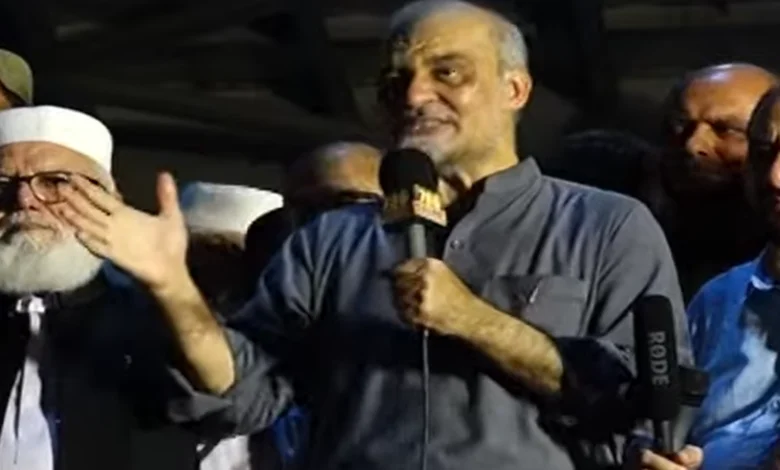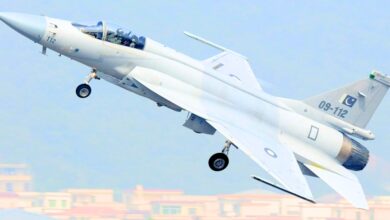
“JI’s Naeem-ur-Rehman Pledges to Maintain Sit-In Until Demands Are Addressed”
Dismisses govt’s claim that negotiations with IPPs are impossible; calls for closure of several IPPs
JI’s Naeem-ur-Rehman Pledges to Maintain Sit-In Until Demands Are Addressed Jamaat-e-Islami Leader Hafiz Naeem-ur-Rehman Stands Firm on Sit-In Protests
Jamaat-e-Islami (JI) leader Hafiz Naeem-ur-Rehman has pledged to persist with the sit-in protests until the government addresses their demands. The protests, which began at Islamabad’s D-Chowk, have now moved to Rawalpindi’s Murree Road due to road closures and other obstacles. Thousands of supporters have gathered to demand the creation of an empowered committee to resolve their grievances.

Government’s Response
In reaction to the protests, Minister for Information, Broadcasting, Culture, and National Heritage Attaullah Tarar announced on Friday that the government is prepared to negotiate with Jamaat-e-Islami to end the disruptive sit-in. A three-member negotiation team has been appointed, including Engineer Amir Maqam, Tariq Fazal Chaudhary, and Ataullah Tarar, to mediate and address the issues raised by the protesters.
Tarar stated, “We are ready to talk for peace, security, and development of the country, which is the main agenda of our government.” He acknowledged JI Chief Hafiz Naeem-ur-Rehman as a seasoned leader whose guidance could help address the issues within the existing framework.
Release of Arrested Workers
In related developments, all Jamaat-e-Islami workers previously detained in Islamabad have been released. The 30 workers, who had been held at Kohsar Police Station and Police Station Secretariat, are now free.
Hafiz Naeem-ur-Rehman’s Address
Addressing the sit-in in Rawalpindi, Hafiz Naeem-ur-Rehman criticized the government for its lack of response to the protesters’ demands. He recounted a tragic incident in Gujranwala related to high electricity bills and criticized the disparity between low house rents and high energy costs. He urged the government to reduce electricity bills, tax landlords instead of salaried individuals, and end the operations of several Independent Power Producers (IPPs).
Naeem-ur-Rehman dismissed the government’s claim that negotiations with IPPs are unfeasible, suggesting that vested interests within the government exploit the IPP system. He emphasized that the sit-in will continue until their demands for relief are met, including the closure of several IPPs.
Directing Workers
Earlier, Naeem-ur-Rehman directed protesters to move to Murree Road to demonstrate the party’s strength. He stated that if resistance continues, he would lead the protest to D-Chowk. He condemned the government’s oppressive actions and noted that public support for Jamaat-e-Islami is growing.
Context of the Protest
Jamaat-e-Islami (JI) began its sit-in in Islamabad with a large turnout of workers at I-8 on the Islamabad Expressway. The protest, led by Hafiz Naeem-ur-Rehman, included a speech condemning the Punjab Police’s raids on JI workers’ homes. The leader emphasized that the protest is for the rights of Pakistan’s 250 million people, not for personal gain.
The government has faced criticism for high electricity bills and the introduction of IPPs, which JI argues burden the public financially. Hafiz Naeem-ur-Rehman called for an end to these practices and a reduction in electricity tariffs.
Police Raids and Road Closures
In response to the protests, police conducted raids targeting PTI and JI members across various cities. In Lahore, over 150 people were arrested, including those allegedly affiliated with PTI, with further raids at key locations. Similar operations were conducted in other parts of Punjab, including Hasanabdal, Sargodha, and Sahiwal.
Authorities have also implemented extensive road blockades and closed the entrance and exit routes to Islamabad to prevent protesters from entering. The Red Zone and key areas such as D-Chowk and the Murree Expressway have been sealed off with containers.
Reason for Protests
PTI and JI are protesting separately for different reasons. PTI is focused on the release of its founder, while JI protests against high electricity bills and new taxes imposed in the 2024-25 budget. Both protests have led to significant disruptions, with Section 144 imposed in Islamabad and severe traffic issues due to road closures.
These protests underscore the ongoing tensions between opposition parties and the government, highlighting public dissatisfaction with current policies and economic conditions.






